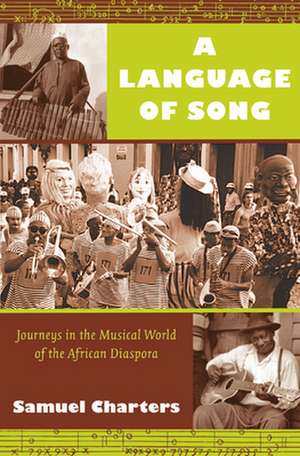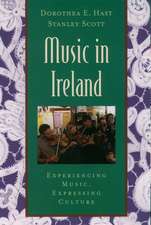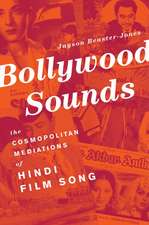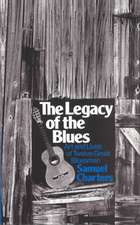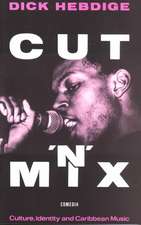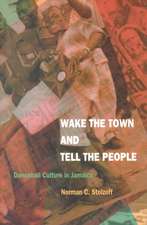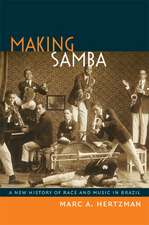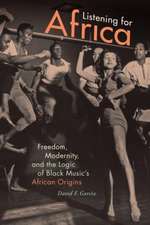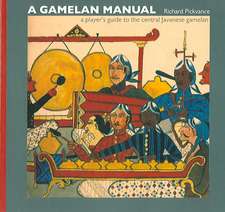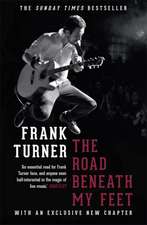A Language of Song – Journeys in the Musical World of the African Diaspora
Autor Samuel Chartersen Limba Engleză Paperback – 5 mai 2009
Preț: 306.99 lei
Nou
Puncte Express: 460
Preț estimativ în valută:
58.75€ • 61.11$ • 48.50£
58.75€ • 61.11$ • 48.50£
Carte tipărită la comandă
Livrare economică 15-29 aprilie
Preluare comenzi: 021 569.72.76
Specificații
ISBN-13: 9780822343806
ISBN-10: 0822343800
Pagini: 368
Ilustrații: 59 photographs
Dimensiuni: 155 x 234 x 28 mm
Greutate: 0.64 kg
Editura: MD – Duke University Press
ISBN-10: 0822343800
Pagini: 368
Ilustrații: 59 photographs
Dimensiuni: 155 x 234 x 28 mm
Greutate: 0.64 kg
Editura: MD – Duke University Press
Cuprins
A Note
1. A Griot's Art: The Story of Everything 1
2. Canaries—Canarios: A New Music in an Old World 17
3. Go Down Chariot: The Georgia Sea Islands and Fanny Kemble. The Slavery Spirituals, Lydia Parrish and Zora Neale Hurston 37
4. Skiffles, Tubs and Washboards: Good Time Music before the Blues 62
5. Red Clark's List: New Orleans Street Jazz and the Eureka Brass Band in the 1950s 81
6. A Dance in Ragged Time: "Shake the World's Foundation with the Maple Leaf Rag" 105
7. Gal, You Got to Go Back to Bimini: The Bahamas, Its Rhymers, and Joseph Spence 133
8. Pretenders, Caressers, Lions, and a Mighty Sparrow: Trinidad's Sweet Calypso 152
9. It Be Like Thunder if a Man Live Close: Nights in Trinidad's Pan Yards 178
10. Reggae Is a New Bag: Kingston Streets, Kingston Nights 203
11. To Feel The Spirit: Gospel Song in the Great Churches of Harlem 230
12. A Prince of Zydeco: Louisiana's Zydeco Blues and Good Rockin' Dopsie 254
13. ¿Como se llama este ritmo? Bebo Valdés, the Music of Cuba, and the Buena Vista Social Club 283
14. Bahia Nights: Carnival in Brazil's Black World 308
Notes 335
Bibliography 339
Index 343
1. A Griot's Art: The Story of Everything 1
2. Canaries—Canarios: A New Music in an Old World 17
3. Go Down Chariot: The Georgia Sea Islands and Fanny Kemble. The Slavery Spirituals, Lydia Parrish and Zora Neale Hurston 37
4. Skiffles, Tubs and Washboards: Good Time Music before the Blues 62
5. Red Clark's List: New Orleans Street Jazz and the Eureka Brass Band in the 1950s 81
6. A Dance in Ragged Time: "Shake the World's Foundation with the Maple Leaf Rag" 105
7. Gal, You Got to Go Back to Bimini: The Bahamas, Its Rhymers, and Joseph Spence 133
8. Pretenders, Caressers, Lions, and a Mighty Sparrow: Trinidad's Sweet Calypso 152
9. It Be Like Thunder if a Man Live Close: Nights in Trinidad's Pan Yards 178
10. Reggae Is a New Bag: Kingston Streets, Kingston Nights 203
11. To Feel The Spirit: Gospel Song in the Great Churches of Harlem 230
12. A Prince of Zydeco: Louisiana's Zydeco Blues and Good Rockin' Dopsie 254
13. ¿Como se llama este ritmo? Bebo Valdés, the Music of Cuba, and the Buena Vista Social Club 283
14. Bahia Nights: Carnival in Brazil's Black World 308
Notes 335
Bibliography 339
Index 343
Recenzii
A Language of Song is an important work. Samuel Charters is a lovely writer, his observations and anecdotes are invaluable, and his background for writing this book perhaps unsurpassed among living writers. He has visited so many important places in the history of the music of the African diaspora during the last half century, and has always done so with great attentiveness and sensitivity. Ted Gioia, author of Work Songs and Healing Songs
In this highly readable account, Samuel Charters takes us on a personal, guided tour of the many musical worlds touched by the African Diaspora. In a sensitive and revealing text, Charters portrays the real stars, often unknown to the general public, who have played a central role in melding a range of traditions, from ancient to modern, into new musical styles. Like Alan Lomaxs, Charterss work has transcended genres and crossed the decades, laying the groundwork and providing inspiration for generations of scholars who have followed. This splendid book is a celebration of a lifetime of enthusiasms.Richard Carlin, author of Worlds of Sound: The Story of Smithsonian Folkways
From The Gambia to the Canary Islands, across the Atlantic to the American Deep South, New Orleans, St. Louis, Manhattan, down to the Bahamas, Trinidad, Jamaica, Cuba, and finally to Brazil. These were once staging grounds of the horrific African slave trade, which eventually became outposts of freedom and cultural and musical creativity. With beautiful, highly evocative prose, Samuel Charters describes a lifetime of tracing these routes and documenting the music that was created along themblues, ragtime, jazz, zydeco, calypso, reggae, steel band, rumba, samba, and much moremusic that has changed the way the world listens and dances.David Evans, author of Big Road Blues: Tradition and Creativity in the Folk Blues
Charterss sensitive examination of the well-heeled Kingston audience and their ambivalent response to this inflammatory music is one of this books high points...The present volume falls somewhere between a memoir and a compilation album: over 14 chapters he recounts his trips in search of what lies behind black music...Charters elegant gambit is to switch back and forth from todays music to its historical precedents...This is a quietly written book, but Charters excitement at such moments of epiphany is palbable...His book is an absorbing, accessible read, underpinned by solid scholarship and the authors good-humoured and seemingly endless curiosity Clive Bell, The Wire, June 2009
The new A Language of Song: Journeys in the Musical World of the African Diaspora finds Charters in the interconnected roles of the uncommonly alert travel writer and an analytical, yet easily understood, ethnomusicologist...Charters first-person writing-straightforward, flowing, quietly passionate, seldom dry, never afflicted by self-absorption or scholarly denseness-provides proof of his gift for understanding various types of African-derived music that he encountered in his travels...Any reader beginning an investigation of this or that music discussed would be wise to spend time with A Language of Song. Readers already hip will find new information and appreciate Charters fresh enthusiasm over the golden sounds. Downbeat, October 2009
Whats truly impressive is the scope of the whole work which, while it devotes a little space to blues and jazz, is basically about all of the rest of the African-derived music we hear from around the world...The quality of the writing is invariably interesting and sympathetic, not to mention informative...theres a timely attention to the economics of slavery and the present-day persistence of racism which merits a wide readership. Brian Priestley, Jazzwise, October 2009
"A Language of Song is an important work. Samuel Charters is a lovely writer, his observations and anecdotes are invaluable, and his background for writing this book perhaps unsurpassed among living writers. He has visited so many important places in the history of the music of the African diaspora during the last half century, and has always done so with great attentiveness and sensitivity." Ted Gioia, author of Work Songs and Healing Songs "In this highly readable account, Samuel Charters takes us on a personal, guided tour of the many musical worlds touched by the African Diaspora. In a sensitive and revealing text, Charters portrays the real stars, often unknown to the general public, who have played a central role in melding a range of traditions, from ancient to modern, into new musical styles. Like Alan Lomax's, Charters's work has transcended genres and crossed the decades, laying the groundwork and providing inspiration for generations of scholars who have followed. This splendid book is a celebration of a lifetime of enthusiasms."--Richard Carlin, author of Worlds of Sound: The Story of Smithsonian Folkways "From The Gambia to the Canary Islands, across the Atlantic to the American Deep South, New Orleans, St. Louis, Manhattan, down to the Bahamas, Trinidad, Jamaica, Cuba, and finally to Brazil. These were once staging grounds of the horrific African slave trade, which eventually became outposts of freedom and cultural and musical creativity. With beautiful, highly evocative prose, Samuel Charters describes a lifetime of tracing these routes and documenting the music that was created along them--blues, ragtime, jazz, zydeco, calypso, reggae, steel band, rumba, samba, and much more--music that has changed the way the world listens and dances."--David Evans, author of Big Road Blues: Tradition and Creativity in the Folk Blues "Charters's sensitive examination of the well-heeled Kingston audience and their ambivalent response to this inflammatory music is one of this book's high points...The present volume falls somewhere between a memoir and a compilation album: over 14 chapters he recounts his trips in search of what lies behind black music...Charter's elegant gambit is to switch back and forth from today's music to its historical precedents...This is a quietly written book, but Charter's excitement at such moments of epiphany is palbable...His book is an absorbing, accessible read, underpinned by solid scholarship and the author's good-humoured and seemingly endless curiosity" Clive Bell, The Wire, June 2009 "The new A Language of Song: Journeys in the Musical World of the African Diaspora finds Charters in the interconnected roles of the uncommonly alert travel writer and an analytical, yet easily understood, ethnomusicologist...Charters' first-person writing-straightforward, flowing, quietly passionate, seldom dry, never afflicted by self-absorption or scholarly denseness-provides proof of his gift for understanding various types of African-derived music that he encountered in his travels...Any reader beginning an investigation of this or that music discussed would be wise to spend time with A Language of Song. Readers already hip will find new information and appreciate Charters' fresh enthusiasm over the golden sounds." Downbeat, October 2009 "What's truly impressive is the scope of the whole work which, while it devotes a little space to blues and jazz, is basically about all of the rest of the African-derived music we hear from around the world...The quality of the writing is invariably interesting and sympathetic, not to mention informative...there's a timely attention to the economics of slavery and the present-day persistence of racism which merits a wide readership." Brian Priestley, Jazzwise, October 2009
In this highly readable account, Samuel Charters takes us on a personal, guided tour of the many musical worlds touched by the African Diaspora. In a sensitive and revealing text, Charters portrays the real stars, often unknown to the general public, who have played a central role in melding a range of traditions, from ancient to modern, into new musical styles. Like Alan Lomaxs, Charterss work has transcended genres and crossed the decades, laying the groundwork and providing inspiration for generations of scholars who have followed. This splendid book is a celebration of a lifetime of enthusiasms.Richard Carlin, author of Worlds of Sound: The Story of Smithsonian Folkways
From The Gambia to the Canary Islands, across the Atlantic to the American Deep South, New Orleans, St. Louis, Manhattan, down to the Bahamas, Trinidad, Jamaica, Cuba, and finally to Brazil. These were once staging grounds of the horrific African slave trade, which eventually became outposts of freedom and cultural and musical creativity. With beautiful, highly evocative prose, Samuel Charters describes a lifetime of tracing these routes and documenting the music that was created along themblues, ragtime, jazz, zydeco, calypso, reggae, steel band, rumba, samba, and much moremusic that has changed the way the world listens and dances.David Evans, author of Big Road Blues: Tradition and Creativity in the Folk Blues
Charterss sensitive examination of the well-heeled Kingston audience and their ambivalent response to this inflammatory music is one of this books high points...The present volume falls somewhere between a memoir and a compilation album: over 14 chapters he recounts his trips in search of what lies behind black music...Charters elegant gambit is to switch back and forth from todays music to its historical precedents...This is a quietly written book, but Charters excitement at such moments of epiphany is palbable...His book is an absorbing, accessible read, underpinned by solid scholarship and the authors good-humoured and seemingly endless curiosity Clive Bell, The Wire, June 2009
The new A Language of Song: Journeys in the Musical World of the African Diaspora finds Charters in the interconnected roles of the uncommonly alert travel writer and an analytical, yet easily understood, ethnomusicologist...Charters first-person writing-straightforward, flowing, quietly passionate, seldom dry, never afflicted by self-absorption or scholarly denseness-provides proof of his gift for understanding various types of African-derived music that he encountered in his travels...Any reader beginning an investigation of this or that music discussed would be wise to spend time with A Language of Song. Readers already hip will find new information and appreciate Charters fresh enthusiasm over the golden sounds. Downbeat, October 2009
Whats truly impressive is the scope of the whole work which, while it devotes a little space to blues and jazz, is basically about all of the rest of the African-derived music we hear from around the world...The quality of the writing is invariably interesting and sympathetic, not to mention informative...theres a timely attention to the economics of slavery and the present-day persistence of racism which merits a wide readership. Brian Priestley, Jazzwise, October 2009
"A Language of Song is an important work. Samuel Charters is a lovely writer, his observations and anecdotes are invaluable, and his background for writing this book perhaps unsurpassed among living writers. He has visited so many important places in the history of the music of the African diaspora during the last half century, and has always done so with great attentiveness and sensitivity." Ted Gioia, author of Work Songs and Healing Songs "In this highly readable account, Samuel Charters takes us on a personal, guided tour of the many musical worlds touched by the African Diaspora. In a sensitive and revealing text, Charters portrays the real stars, often unknown to the general public, who have played a central role in melding a range of traditions, from ancient to modern, into new musical styles. Like Alan Lomax's, Charters's work has transcended genres and crossed the decades, laying the groundwork and providing inspiration for generations of scholars who have followed. This splendid book is a celebration of a lifetime of enthusiasms."--Richard Carlin, author of Worlds of Sound: The Story of Smithsonian Folkways "From The Gambia to the Canary Islands, across the Atlantic to the American Deep South, New Orleans, St. Louis, Manhattan, down to the Bahamas, Trinidad, Jamaica, Cuba, and finally to Brazil. These were once staging grounds of the horrific African slave trade, which eventually became outposts of freedom and cultural and musical creativity. With beautiful, highly evocative prose, Samuel Charters describes a lifetime of tracing these routes and documenting the music that was created along them--blues, ragtime, jazz, zydeco, calypso, reggae, steel band, rumba, samba, and much more--music that has changed the way the world listens and dances."--David Evans, author of Big Road Blues: Tradition and Creativity in the Folk Blues "Charters's sensitive examination of the well-heeled Kingston audience and their ambivalent response to this inflammatory music is one of this book's high points...The present volume falls somewhere between a memoir and a compilation album: over 14 chapters he recounts his trips in search of what lies behind black music...Charter's elegant gambit is to switch back and forth from today's music to its historical precedents...This is a quietly written book, but Charter's excitement at such moments of epiphany is palbable...His book is an absorbing, accessible read, underpinned by solid scholarship and the author's good-humoured and seemingly endless curiosity" Clive Bell, The Wire, June 2009 "The new A Language of Song: Journeys in the Musical World of the African Diaspora finds Charters in the interconnected roles of the uncommonly alert travel writer and an analytical, yet easily understood, ethnomusicologist...Charters' first-person writing-straightforward, flowing, quietly passionate, seldom dry, never afflicted by self-absorption or scholarly denseness-provides proof of his gift for understanding various types of African-derived music that he encountered in his travels...Any reader beginning an investigation of this or that music discussed would be wise to spend time with A Language of Song. Readers already hip will find new information and appreciate Charters' fresh enthusiasm over the golden sounds." Downbeat, October 2009 "What's truly impressive is the scope of the whole work which, while it devotes a little space to blues and jazz, is basically about all of the rest of the African-derived music we hear from around the world...The quality of the writing is invariably interesting and sympathetic, not to mention informative...there's a timely attention to the economics of slavery and the present-day persistence of racism which merits a wide readership." Brian Priestley, Jazzwise, October 2009
Notă biografică
Samuel Charters
Textul de pe ultima copertă
"From The Gambia to the Canary Islands, across the Atlantic to the American Deep South, New Orleans, St. Louis, Manhattan, down to the Bahamas, Trinidad, Jamaica, Cuba, and finally to Brazil. These were staging grounds of the horrific African slave trade, which eventually became outposts of freedom and cultural and musical creativity. With beautiful, highly evocative prose, Samuel Charters describes a lifetime of tracing these routes and documenting the music that was created along them--blues, ragtime, jazz, zydeco, calypso, reggae, steel band, rumba, samba, and much more--music that has changed the way the world listens and dances."--David Evans, author of "Big Road Blues: Tradition and Creativity in the Folk Blues"
Descriere
Recounts experiences from a half-century spent following, documenting, recording, and writing about the Africa-influenced music of the United States, Brazil and the Caribbean
